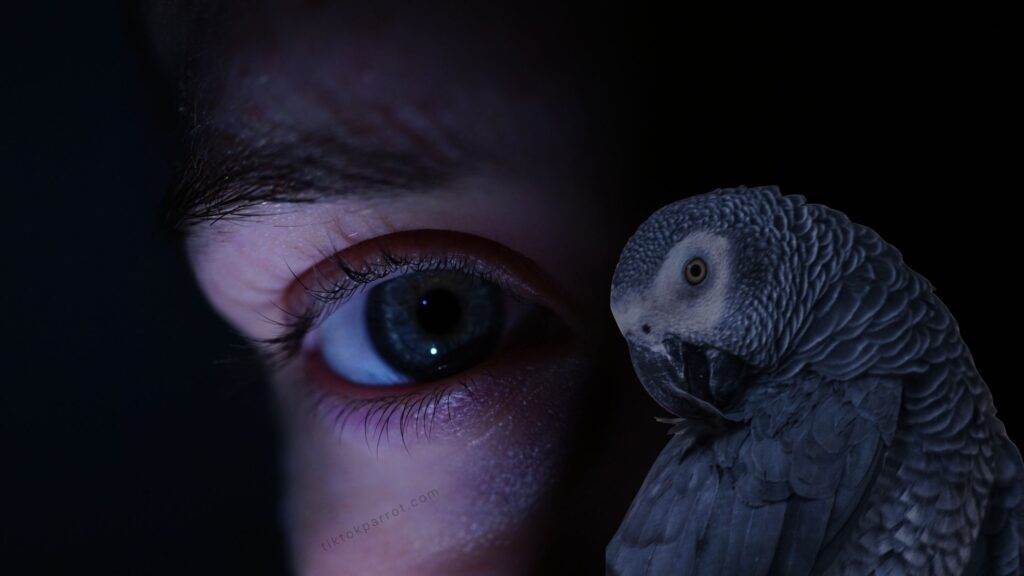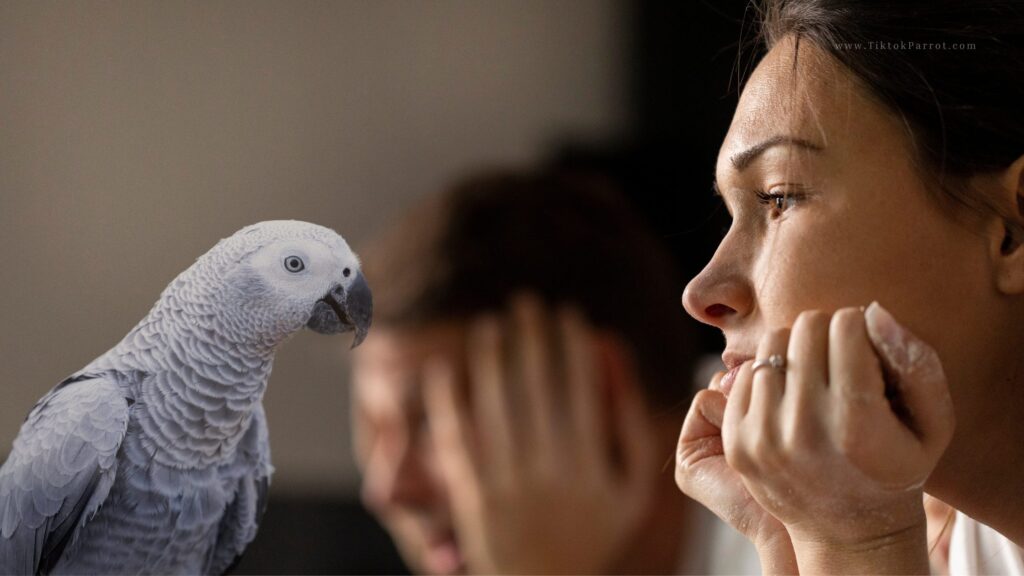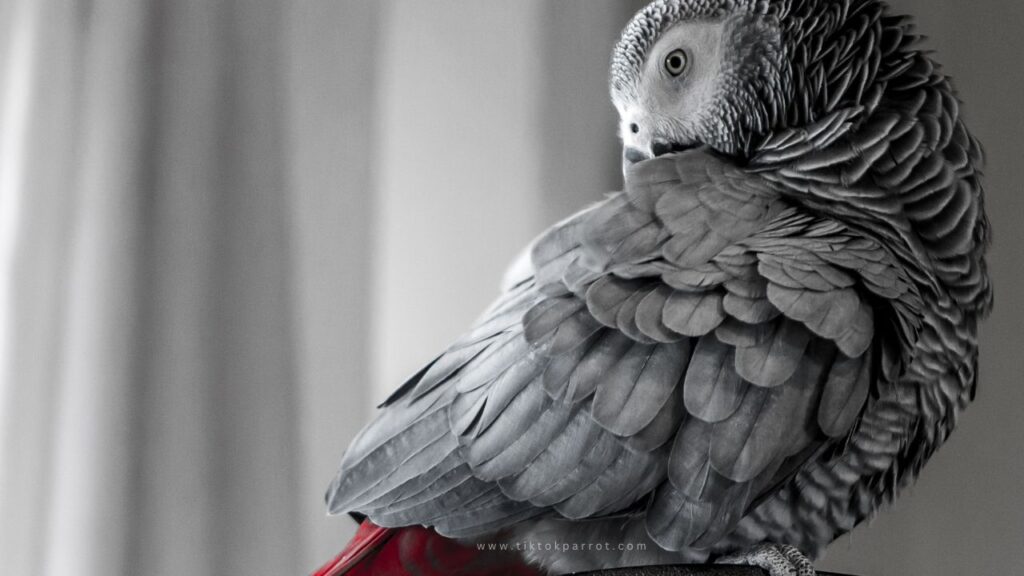Alright, fellow parrot parents, let’s talk about something important today. You know, that lovely, feathery little buddy who constantly plots how to sneak into the peanut stash? Yeah, your African Grey Parrot. It’s all fun and games until you notice your beloved bird is… well, a bit jittery.
Suddenly, it seems like your feathered pal is a bundle of nerves, and not in the “Oh, no, the cat is watching me again” way—we’re talking anxiety here. So, let’s roll up our sleeves (or wings, if you’re the bird here) and talk about how to manage anxiety in African Grey Parrots. Ready? Let’s dive in!
Table of Contents
Understanding Anxiety in African Grey Parrots

First things first, what exactly does anxiety look like in an African Grey Parrot? It’s not like they can hop onto a therapist’s couch and start talking about their issues with millet distribution. Instead, they’ll let you know in other ways.
You might see a few telltale signs like excessive feather plucking, pacing back and forth, or even becoming strangely silent. Yes, a silent African Grey—as unsettling as an unplugged refrigerator. Trust me, they’re never that quiet without a reason.
So why is your smart, sensitive little feathered companion feeling so stressed out? African Grey Parrots are known for being quite intelligent and socially sensitive, but this also means they’re susceptible to emotional challenges.
Think of them as the overly observant friend who notices when someone changes the brand of chips at a party. They notice everything. Changes in their routine, new people, loud noises—all of this can make them anxious. Understanding this anxiety is the first step to managing it effectively.
Common Causes of Anxiety in African Grey Parrots

Before we get into the “how-to” part, it’s worth identifying some of the common triggers that might be stressing your African Grey Parrot out:
- Change in Environment: Moving furniture around or switching cages? Your parrot probably thinks it’s the end of the world.
- Lack of Stimulation: An African Grey without mental stimulation is like an athlete without a sport—it gets frustrating, quickly.
- Loneliness: Yep, just like that one neighbor who talks to their plants. African Greys need social interaction and can get anxious if left alone for long periods.
- Loud Noises: Let’s face it, fireworks are nobody’s favorite—least of all, your parrot’s. Unexpected loud noises can send them into a tailspin.
- Changes in Routine: Birds love a good, predictable schedule. Imagine waking up one day and the sun rises from the west—that’s how they feel when you suddenly change their feeding or playtime routine.
How to Help Your African Grey Parrot Manage Anxiety

Now that we know some of the anxiety culprits, let’s focus on how to help. Because, honestly, no one likes a sad parrot, especially not your parrot. Let’s make sure your bird is back to its chirpy self in no time.
1. Keep a Consistent Routine
Remember that one time you decided to have breakfast at dinner? Weird, right? African Grey Parrots like things predictable. If you feed them breakfast at 8 AM, keep feeding them at 8 AM. Establish a consistent schedule for meals, playtime, and even bedtime. Your parrot will love knowing what comes next—and they won’t have to fret about when they’ll next get their favorite snack.
2. Provide Mental Stimulation
Think of your African Grey Parrot as that overly curious kid in class who always raises their hand. They’re bright, and they need activities to stay occupied.
Puzzle toys, foraging activities, and even learning new words (yes, even that phrase you accidentally said once—they remember) can be fantastic ways to keep their minds engaged. Boredom is a breeding ground for anxiety, so be sure to provide toys that challenge their intelligence.
3. Minimize Stressful Triggers
Loud noises can scare the feathers off of an African Grey. Literally. If you know there are going to be fireworks, construction work, or other loud disturbances, try covering the cage or relocating it to a quieter area. Turn on some calm background music—something gentle like classical tunes or nature sounds—to soothe them. Picture it like a spa day for your parrot.
4. Ensure They Get Enough Social Time
African Grey Parrots are social creatures, and they can get lonely fast. Imagine spending a whole day with no one to talk to. Horrible, right?
Make sure you’re spending enough quality time interacting with your parrot—talk to them, whistle, or even read them a book (hey, no judgment here). If you’re often away from home, consider setting up a bird-safe camera so you can talk to them remotely. Just knowing they haven’t been abandoned can make all the difference.
5. Create a Comfortable Environment
Nobody likes a cold, unwelcoming room—least of all your parrot. Make sure their cage is in a comfortable spot with natural light but away from drafts. And give them some perches of different sizes and textures, because just like us, sometimes they want a chair, sometimes they want a hammock. The environment they live in can directly impact their anxiety levels, so making sure it’s cozy and safe is essential.
6. Use Positive Reinforcement
Have you ever had a day when you just wanted someone to say, “You’re doing great, buddy”? Well, your parrot is no different. Reward them when they’re calm and behaving well. This can be with treats, a favorite toy, or even just verbal praise and head scratches.
Positive reinforcement helps your parrot understand what behaviors are okay and which ones aren’t necessary—like trying to de-feather themselves out of stress.
7. Introduce Foraging Opportunities
Foraging is like a treasure hunt for birds, and it’s also a great anxiety reducer. Hide some of their favorite snacks in their cage (make them work for it, but don’t make it impossible—you’re not trying to frustrate them!). Foraging taps into their natural instincts and can keep them occupied for hours, helping to reduce feelings of restlessness and anxiety.
Keeping It All in Perspective
Remember, your African Grey Parrot isn’t just another pet—they’re incredibly intelligent, emotional creatures. And while it’s easy to get frustrated when your bird is anxious or stressed (seriously, plucked feathers everywhere), it’s important to remember that they need our help to feel safe and loved.
Anxiety in African Grey Parrots isn’t something that goes away overnight, but with time, patience, and lots of love (and millet treats), you can help them feel more secure. The key is understanding what triggers their anxiety and taking steps to address these triggers.
So, fellow parrot parents, if you notice your African Grey looking a bit down or suddenly fluffing up in stress, take a moment. Think about what’s changed in their world, and see what you can do to bring back some comfort. After all, these little guys may have wings, but they need us to help them soar.
My Final Thoughts
I would say managing anxiety in your African Grey Parrot can be challenging, but it’s definitely possible with the right approach. From maintaining a consistent routine to offering plenty of mental stimulation, your parrot can go back to being that cheerful, chatty friend who always has a clever word or two. Remember, it’s all about love, patience, and providing an environment where they feel secure.
And hey, if you have a story about your anxious bird finally finding its groove, I would love to hear about it! Drop a comment below and share your experiences. Let’s help our African Greys live their best, most anxiety-free lives!
If you liked this blog, please share it with your family and friends who might also find it helpful. If you love African Greys, join our community of Grey owners! You can meet other owners, share tips and learn from each other.
Stay safe and much love!



